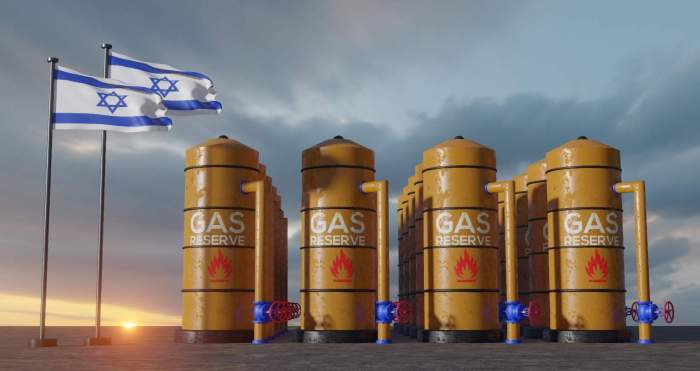Economic analysis: The impact of Iran’s strike on Israel’s gas infrastructure

By Asif Aydinli
On October 1, 2024, Iran launched a massive missile strike targeting key sites in Israel, including offshore gas platforms near Ashkelon .
This event not only marked a new phase in the regional conflict escalation but also brought significant potential economic consequences for both Israel and the global energy market. Let’s explore how this attack could affect various aspects of the global economy, energy security , and regional politics.
The strategic importance of Israel’s gas infrastructure
Israel’s offshore gas fields are crucial to its economy. The main assets, Tamar, Leviathan, Karish, and Dalit, not only supply around 70% of the country’s electricity needs but are also key revenue sources from exports. In recent years, Israel has become a prominent player in the Eastern Mediterranean energy market, exporting natural gas to countries like Jordan, Egypt, and indirectly to Turkey and the European Union through Egypt.
The suspension of operations at two major fields—Tamar and Leviathan—due to the missile attack is already impacting the stability of Israel’s energy system. The Tamar platform, located just 24 km from Ashkelon, may have been hit by one of the missiles. Leviathan, farther offshore, has also been shut down as a precaution. With the conflict escalating and no clear timeline for restoring operations, Israel faces a serious threat to its energy security.

Impact on Israel’s domestic energy sector
Over the past two decades, Israel’s economy has become heavily reliant on natural gas. While gas played a negligible role in the country’s energy balance in the early 2000s, today it fuels around 70% of electricity generation. Given the scale of the attack and the possibility of prolonged disruptions, Israel could face an energy shortfall. Alternative energy sources like solar and wind power are unlikely to sustain stable energy supplies in the long term.
Moreover, reduced or halted gas production will inevitably lead to higher domestic prices, negatively affecting both industrial and household sectors. To stabilize the situation, the Israeli government may have to turn to reserve energy sources or increase imports of hydrocarbons from other countries.
Export flows and regional risks
Israel has long established itself as a regional exporter of natural gas. Since January 2017, gas from the Tamar field has been supplied to Jordan, and since 2020, Leviathan gas has been exported to Egypt. These exports are vital for both Jordan’s and Egypt’s energy supply, with Egypt re-exporting some gas as liquefied natural gas (LNG) to Turkey and the European Union.
The suspension of Tamar and Leviathan operations threatens the stability of these exports. If the halt lasts for an extended period, it could disrupt energy supplies in Jordan and Egypt, dealing a blow to their domestic economies. Egypt, in particular, is vulnerable, as it relies on gas exports to meet its international LNG commitments.
Israel’s inability to maintain regular gas supplies to Egypt could undermine Egypt’s LNG export plans, which in turn could impact the energy security of Turkey and the European Union. This disruption could also lead to higher gas prices in Europe, already grappling with reduced Russian gas supplies.
Global implications for energy markets
This strike on Israel’s infrastructure introduces new risks to the global energy system. Given Israel’s role as a regional exporter and the significance of Eastern Mediterranean gas infrastructure to the international market, further conflict escalation could impact global gas supply chains. Particularly vulnerable is marine gas transportation through the Strait of Hormuz, a critical route for oil and gas exports from the Persian Gulf to global markets.
Risks increase if Iran becomes more deeply involved in the conflict, potentially leading to further disruptions in global oil and gas security. A blockade of the Strait of Hormuz, for example, would put immense pressure on global oil and gas prices, sparking price surges that could exacerbate inflationary trends and pose additional risks to the global economy.
Political and geopolitical consequences
Iran’s involvement in the conflict with Israel not only escalates military tensions but also heightens geopolitical instability in the region. The threat of retaliatory strikes on Iranian sites, such as nuclear and oil infrastructure, could lead to a broader escalation, affecting not only the Middle East but the international community at large.
The risk of further conflict escalation could impact the strategic interests of key global players, including the United States, the European Union, China, and Russia. Each has economic interests tied directly to the region’s energy stability. In the context of global inflationary and energy crises, further escalation could undermine efforts to stabilize the global economy.
Outlook and possible scenarios
If the Tamar and Leviathan gas fields are not operational by October 7, 2024, Israel could face severe energy and economic consequences. In the short term, Israel can withstand disruptions by using reserves or temporary solutions such as importing hydrocarbons, but prolonged shutdowns will lead to electricity shortages and a sharp rise in prices.
In the event of further conflict escalation, Israel may respond militarily with strikes on Iranian strategic sites. This would undoubtedly introduce new risks to the global energy system, especially if Iran retaliates by restricting oil and gas exports through the Strait of Hormuz or attacking key energy assets in the region.
Conclusion Iran’s strike on Israel’s gas infrastructure poses a significant threat to the stability of the Eastern Mediterranean energy system and global energy markets. The suspension of Israel’s key gas fields could lead to negative consequences for its domestic energy security, gas exports, and international LNG supply chains. Amid global geopolitical instability and inflationary crises, further conflict escalation could introduce serious risks to the global economy, potentially sparking a new wave of energy crises.

